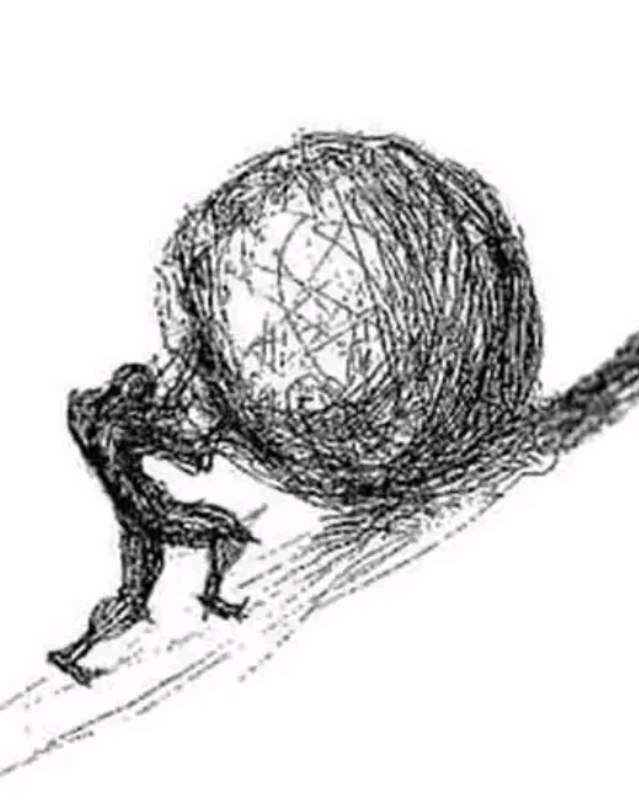cross-posted from: https://hexbear.net/post/2858492
I think I understand the simple model of base and superstructure (but that was Gramsci’s model)
The simple use of quantitative to qualitative change, and vice versa
The simple fact that contradictions can exist in a society, manifesting in the form of problems, which are symptoms of its economic systems…
I don’t think its about thesis + anti-thesis -> synthesis.
I think its about one economic class, like capitalist to feudal lord, dominating over one class, and absorbing its birthmark attributes, before surpassing its birthmarks overall…
Or as if a capitalist upon its created proletariat, not only ruling over them, but co-opting or destroying any of its measures
To me, its about who the ruling most HEGEMONIC class is, and how it operates…
Other than that, I don’t know how else to apply it, let alone know if its somewhat broadly accurate…
Correct me if I’m wrong, if not elaborate on what ye mean?
Dialectical materialism can be applied to basically anything and it takes awhile to develop it. I’m still not an expert by any means but I have certainly built a better understanding of it over the last 6 months as I’ve touched grass a lot, lot more and also re-read a lot.
It’s a pretty broad question, asking how we apply it to broader society. So I’ll just do an example I guess.
When looking at an issue, the first thing(s) I look for are the contradictions within it and the contradictory relationships it has with other things. We know literally everything is interconnected, and that everything exists in a state of contradiction until it is resolved (and then transforms into a different contradiction but blahbababa) so that’s where I usually start.
Thinking about a gas station near my home, in isolation, is just a gas station. It operates perfectly well and statically to our liberal friends or if you’re not paying attention. But taking a diamat lens to it I would say that there exist tons of contradictions and interconnected relationships that drive the success or failure and the overall conditions of that station. There exists obviously the contradiction between the workers and capital owners there, the one we all know. This contradiction, the primary one in economic life under capitalism, sets the stage for others to pop up - a worker may recognize the futility in how hard they work there, and leave certain tasks undone. Contradictions like that within the gas station build up until they are resolved by either another worker taking the task up, the worker getting fired, or people neglecting to come to that station if it’s bad enough, leading to its closure. This is not static, and is constantly developing and in relation with everything else in the material world.
Connecting the gas station to society is easy from there, you just take off the magnifying glass and look outwards. The station exists in one part of a country that operates under that same economic system. So more contradictions pop up that are not internal to the station. Perhaps the piping that flows the fuel is not properly maintained because those workers are on strike, and ceases to function. The station is now defunct due to contradictions of the economic system, due to no fault of its own other than existing under this material reality.
Everything that happens affects everything that happens. The universe is a dynamic interconnected place and using the diamat framework is immensely helpful for making sense of things.
I could give a kind of abstract math equation, which can be helpful, but for me examples usually do the trick better. The more examples you hear the easier it will be to formulate your own and yeah.
Nobody has dialectical materialism “figured out” either, btw. The best analyses require many people, many years, much PRACTICE -> THEORY -> PRACTICE etc.
Hope this made sense, and if anyone with a better understanding of this than me wants to chime in feel free.
Good question. But very broad! Sounds like you’ve got the essentials sorted. What do mean by ‘broader analysis of society’? If you give me something a little more specific I might be able to run through an analysis with you to show you how I’d do it. (Depending on the topic!) I could give you some quotes relating to what I interpret as ‘broader … society’ but it’ll be very abstract.
Interest rates? That’s a topic…
I start at the premise that any change anywhere brings change somewhere else, and you have to be mindful of that all the time.
Then I recommend the GOAT Elementary Principles of Philosophy
and after that I’ll write the rest later lol
Tysm…
It’s the curse of being a leftist. I walk past a coffee shop and think about how there are no third spaces left to hang out for free. Because they were systematically destroyed, in order to separate the people into individuals, and at the same time commodify their leisure at ever growing costs. How there are so many people working miserable jobs in those coffee shops, jobs that we don’t need in the first place. About the chains that have swallowed all the individual businesses that could’ve been of higher quality, had better working conditions and pay. About the bench outside with extra railings, so that the unhoused people couldn’t sleep on it. They’re forced to sleep in designated “bad hoods”, from where they will eventually be kicked out by
pigsfilth so that their hoods can be gentrified. And all those freshly gentrified hoods will have tons of empty condos that would never house even one of those displaced people…Then I smoke a joint, watch some cute animal videos, and forget about it until the next time I walk past a coffee shop.
Not sure why people call cops “pigs” when pigs are cuties
Pigs also have emotional intelligence. Unlike cops.
Actually, hard agree. Can we make filth a thing instead?
To be completely honest: I don’t
I highly recommend Mao’s essay On Contradiction: https://www.marxists.org/reference/archive/mao/selected-works/volume-1/mswv1_17.htm
I’ve been trying to revisit it more than once until it crystallizes in application. I can try to give an example of how I apply what I think is roughly dialectical thinking beyond purely basic class stuff. It’s something I thought through a while ago, but I’ve never formally written down my reasoning and observations, so bear with me.
In text generation AI, I encountered a problem. I’m making a long story short, but I found there were companies, one in particular that I experienced directly, who provided an AI-powered chat service to help people with emotional support and loneliness (that was in part how it was advertised and scripted). However, this service also pulled the rug on people at some point and caused a lot of damage.
This drove me to ultimately seek out and support a lesser known (at least at the time) AI service that was staunch on user privacy (using encryption to accomplish it) and being uncensored text (you can write anything in private with it). Within this, I had to contend with the fact that I am not someone who blanketly goes “free speech”; I am not someone who thinks people should just be able to do whatever no matter the circumstances. I also had to contend with the fact that I am not a blanket supporter of AI, considering its implications for messing with the jobs of working class people. Even more complicated, this was (still is) an AI service that also allows image generation (though that aspect of it is not something where you can generate anything - you can’t generate “lifelike” due to how the model is trained) and image generation arguably poses more of a threat to jobs than text generation, since it creates an image start to finish without needing an artist in the process at all. Furthermore, this was the main source of funding for that company (they don’t take money from outside investors).
But, this was also the only AI service taking seriously the consequences of dealing with emotionally vulnerable people who are saying private and sensitive things to an AI. In order to side with these people and side with them having a harm reduction place to cope with the loneliness and abandonment capitalist life has inflicted on so many, I am also siding in some part with the development of AI and the proliferation of it and consequences intersecting with it and capitalism devaluation of labor, even if I try to have conscious limits on how I partake in that and in what way.
So, my “support” of AI in this understanding is conditional and developing, based on how it intersects with what regular people are dealing with and the consequences it has, helpful or unhelpful. It also contains a certain amount of contradiction, in the sense that I am arguably allying with people I’d rather not be, to an extent, in order to reduce harm for the time being and support development of AI in a direction that is genuinely safer (not “safer” in the corporate PR meaning). I am not capitulating on caring about regular people in the process, but I am having to choose where I put my energies in the direction of substantively helping them. I don’t pretend it is a challenge or threat to the capitalist order, something like this, but it is something where I tried to really go through it and work out what was the best course of action while keeping the ideological core intact. There was/is, as far as I could discern, no “right answer” in a binary meaning of it. Instead, I was trying to work out where in the contradictions of it made the most sense to take action to enact my intent to side with regular people and what form that action would take.
I am not very confident on the subject and practice of dialectical materialism, so please don’t take this as a model of it. But hopefully it can provide some food for thought, if nothing else.
Tysm…
Mostly with niche topics like late stage media, whether or not gen alpha is cooked (answer is yes), overaestheticization. As for political topics the only major thing I did is explain why the proles need a monopoly on violence to defend against counter-revolution.






